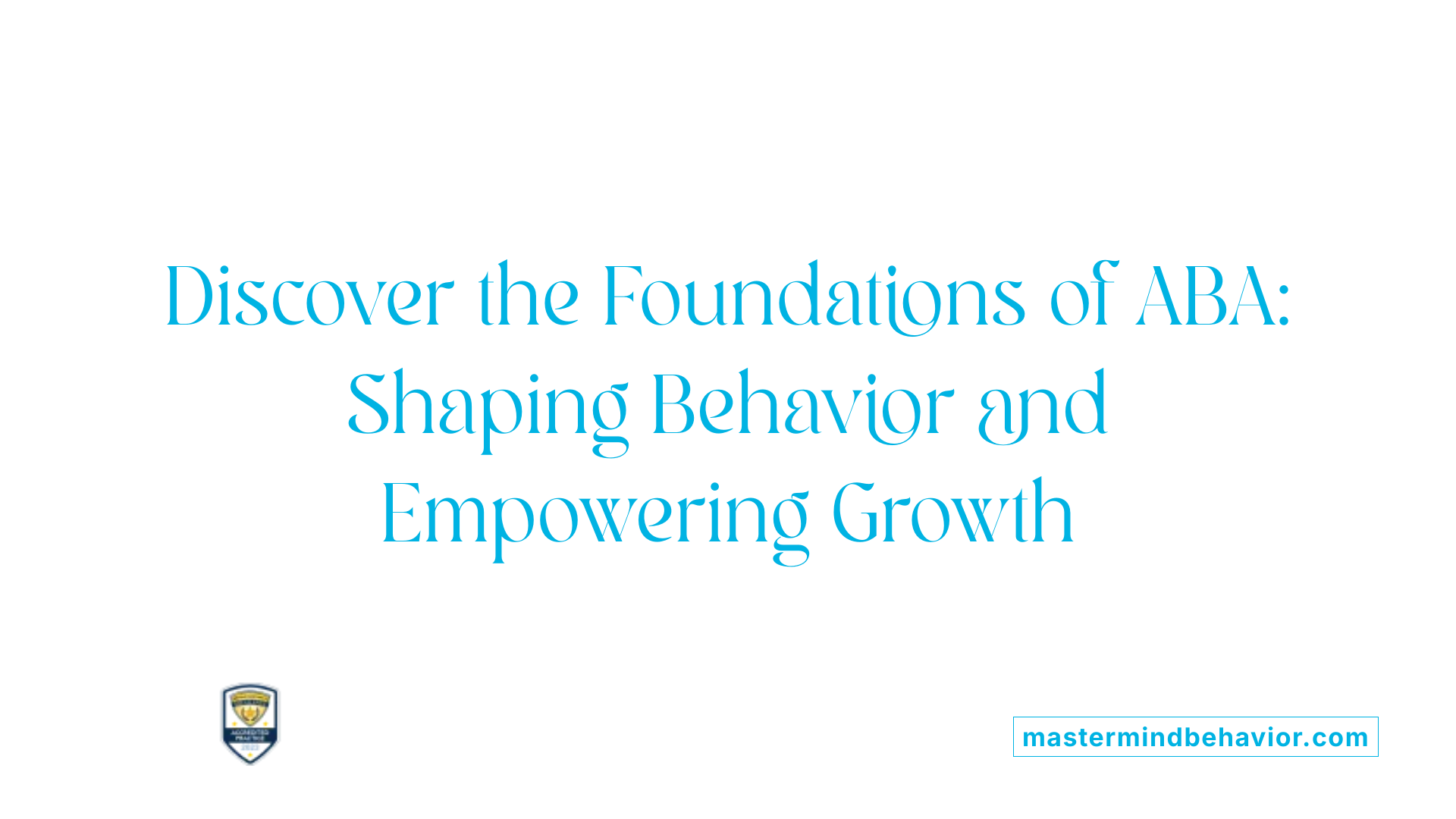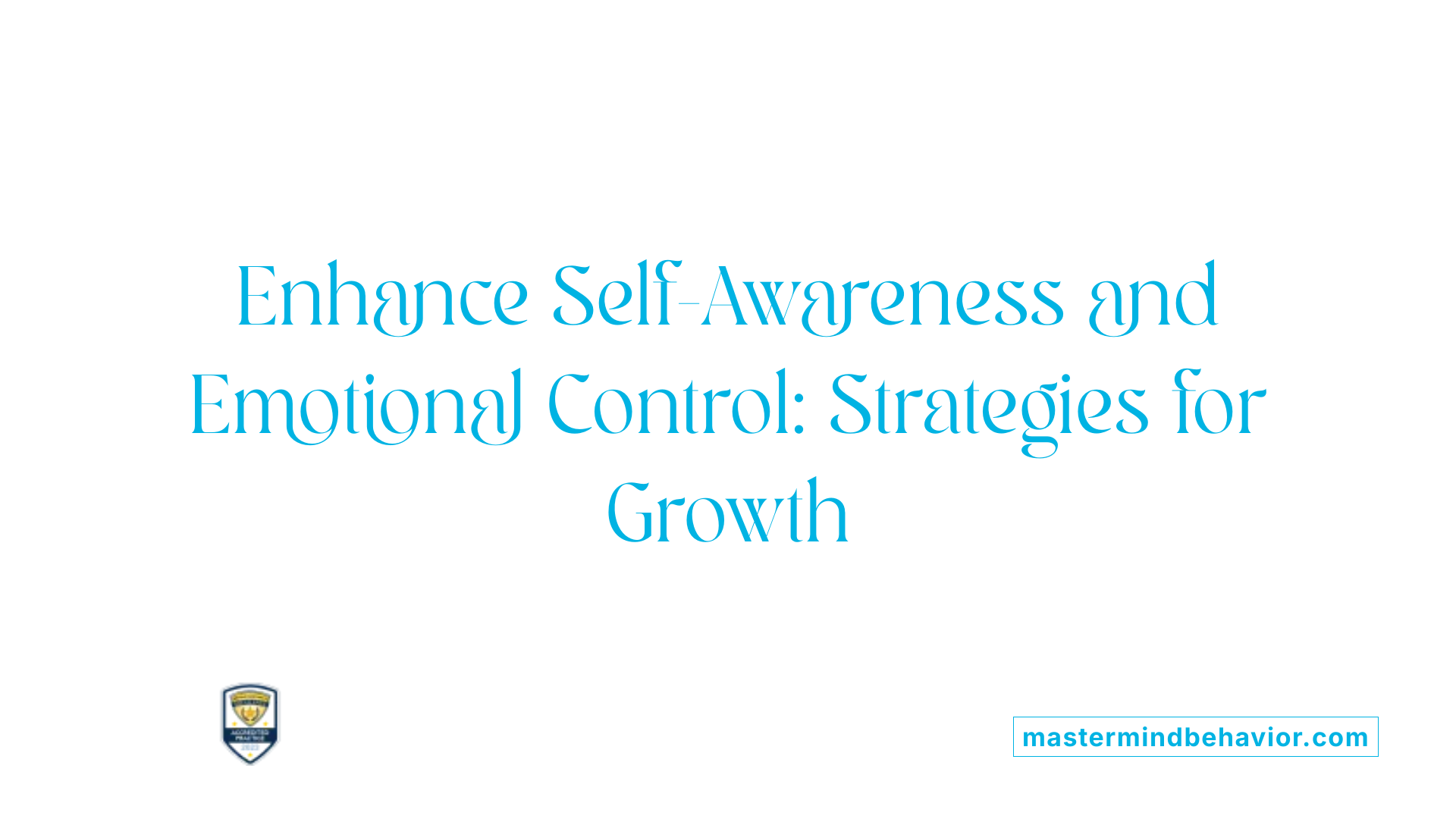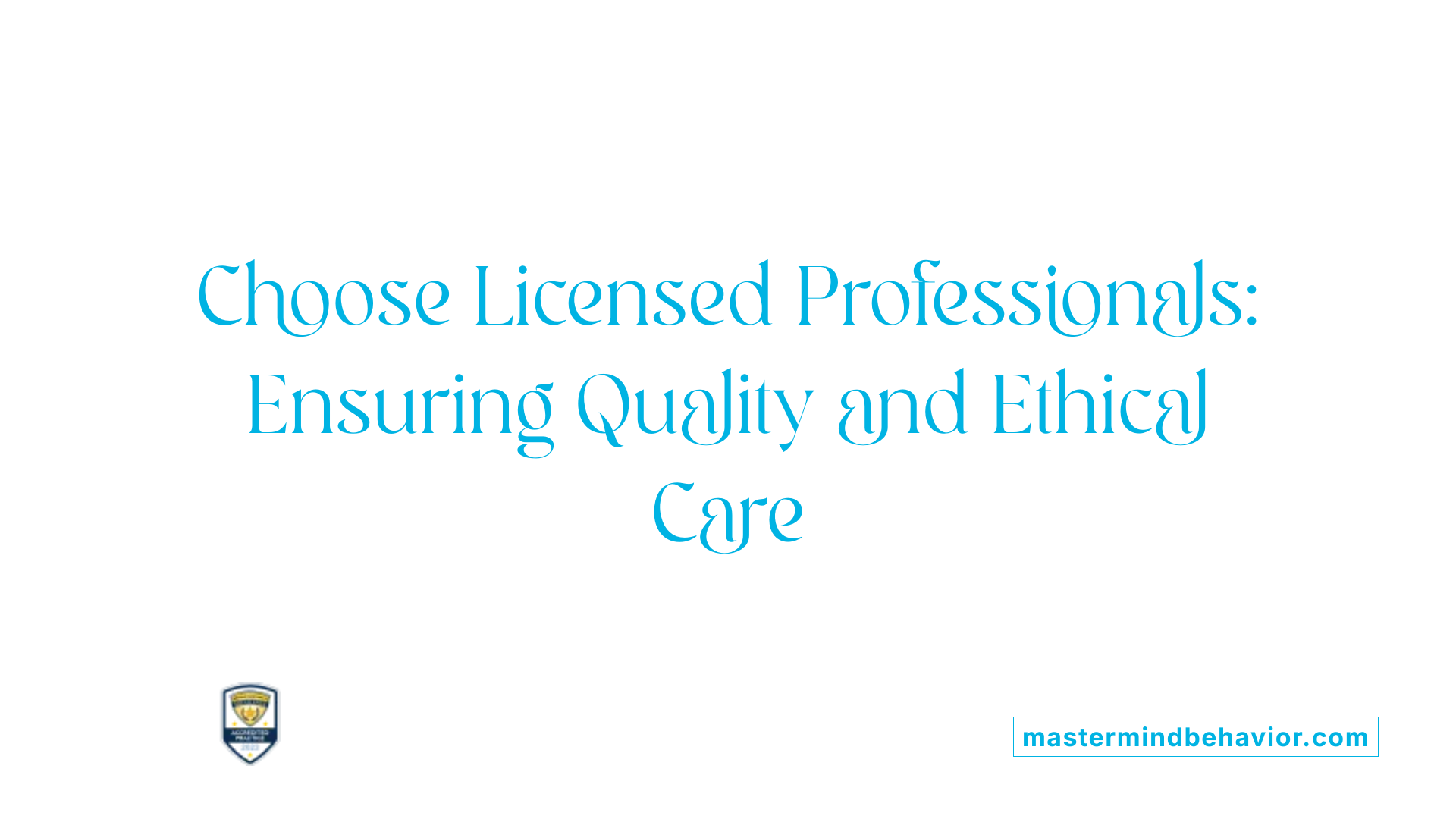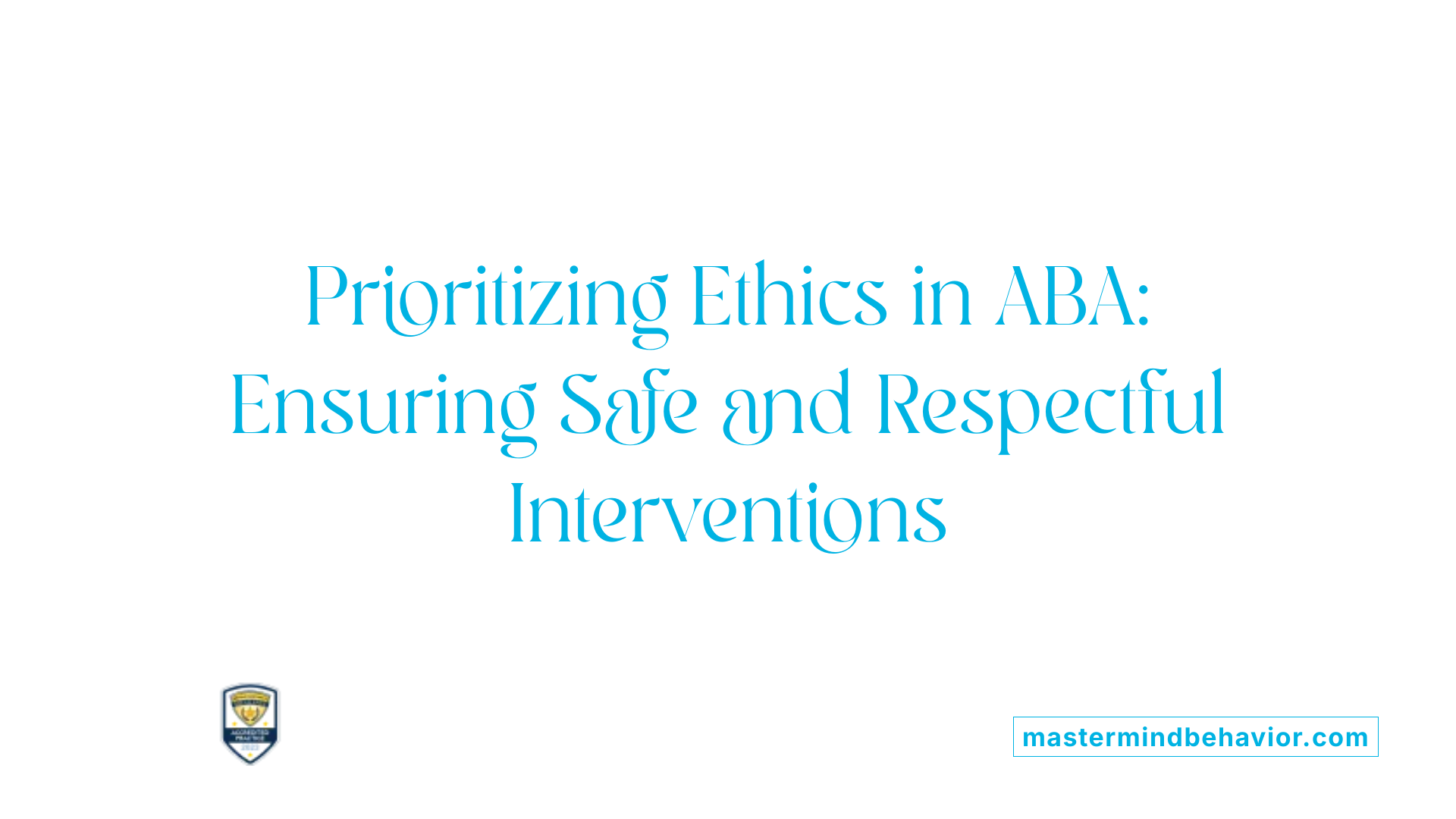Understanding ABA Therapy and Its Impact on Emotional Growth
Applied Behavior Analysis (ABA) therapy is a structured, evidence-based approach that plays a crucial role in fostering emotional independence, particularly among individuals with autism. Its tailored interventions aim to improve social skills, emotional regulation, and adaptive behaviors, laying the foundation for greater autonomy and resilience.
The Core Principles of ABA Therapy

Fundamentals of ABA
Applied Behavior Analysis (ABA) is a scientific approach that examines how behaviors are learned and maintained. It focuses on understanding the relationship between environmental stimuli and behavior outcomes. ABA works on the premise that behaviors can be shaped and modified through systematic interventions. It emphasizes data-driven decision making and employs various techniques to encourage positive behavior changes.
Operant Conditioning
One of the main mechanisms behind ABA is operant conditioning, a learning process where behaviors are influenced by their consequences. Reinforcements increase the likelihood of a behavior recurring, while punishments decrease it. ABA uses positive reinforcement to encourage desired actions, such as communication or social skills. Conversely, extinction and other strategies help reduce unwanted behaviors.
Behavior Modification Techniques
ABA therapy employs a range of behavior modification methods tailored to individual needs. These include prompting, which guides an individual to perform a desired behavior; fading, where prompts are gradually reduced; chaining, which links individual steps into a sequence; and naturalistic teaching, which integrates learning into everyday activities. These techniques aim to build skills incrementally, fostering independence and emotional resilience.
How ABA Promotes Emotional Independence
ABA therapy plays a crucial role in fostering emotional independence. It systematically teaches individuals to recognize, manage, and regulate their emotions by analyzing behaviors and applying reinforcement strategies. Techniques like prompting, fading, and chaining help build essential communication and social skills, which are vital for emotional stability.
By understanding the functions behind behaviors, ABA helps reduce challenging patterns and reinforces adaptive skills. Early, personalized interventions leverage neuroplasticity, allowing individuals to develop confidence and resilience. Overall, ABA's evidence-based, tailored strategies not only improve immediate behaviors but also contribute substantially to emotional independence and a better quality of life.
Additional Information about Therapy Choices
Choosing the right mental health professional is essential for effective therapy. Our directory features licensed therapists, psychologists, social workers, and counselors with detailed profiles that include specialties, treatment approaches, and contact details. This ensures clients can find qualified professionals suited to their specific needs.
Additionally, understanding therapy options, insurance coverage, and confidentiality policies is important. Our website provides reliable, educational content to help users make informed decisions, supporting a safe and effective mental health journey.
Teaching Self-Awareness and Emotional Regulation

How does recognizing emotions contribute to self-awareness?
Recognizing emotions is the first step toward developing self-awareness. When individuals can identify what they are feeling, it allows them to understand their reactions and behaviors better. This awareness helps in managing emotions healthily and responding appropriately in different situations.
What are effective coping strategies for emotional regulation?
Coping strategies are techniques that help manage intense emotions. Techniques such as deep breathing, mindfulness, and grounding exercises provide immediate relief from emotional distress. In addition, developing routines, seeking social support, and engaging in physical activity are also beneficial. These methods help individuals maintain control over their emotions and reduce stress.
How can behavioral reinforcement support emotional growth?
Behavioral reinforcement involves encouraging positive emotional responses and adaptive behaviors through rewards or praise. This approach helps reinforce the development of healthy emotional habits. When individuals receive positive feedback for managing their emotions well, they are more likely to repeat those behaviors, leading to improved emotional regulation over time.
Why choose licensed mental health professionals?
While exploring mental health support, it is important to seek licensed professionals such as therapists, psychologists, social workers, and counselors. Licensure ensures practitioners have met strict educational and ethical standards, providing assurance of quality and safety. The website offers detailed profiles, including their specialties, treatment methods, and contact details, facilitating informed decisions.
What role does education about therapy types, insurance, and confidentiality play?
Understanding different therapy options, how insurance coverage works, and confidentiality rules helps individuals make educated choices about their mental health care. The site emphasizes this educational aspect, which adds to its reliability as a trustworthy source of information. It aims to empower users to select appropriate, licensed professionals confidently.
| Topic | Description | Additional Info |
|---|---|---|
| Recognizing Emotions | Identifying current feelings and understanding their impact | Critical in developing self-awareness |
| Coping Strategies | Techniques to manage intense emotions effectively | Includes mindfulness, breathing exercises, routines |
| Behavioral Reinforcement | Using rewards to encourage positive emotional behaviors | Reinforces healthy emotional habits |
| Choosing Professionals | Importance of licensed practitioners and detailed profiles | Ensures quality care, includes specialties, contact info |
| Educational Content | Information on therapy types, insurance, and confidentiality | Builds trust and helps informed decision-making |
This comprehensive approach to teaching self-awareness and emotional regulation demonstrates how structured support and professional guidance contribute to emotional well-being. By understanding emotions, practicing coping strategies, and reinforcing positive behaviors, individuals can enhance their emotional resilience and autonomy.
Structuring Daily Routines to Support Emotional Independence
What tools and resources are used in ABA therapy to promote emotional regulation and independence?
Applied Behavior Analysis (ABA) therapy employs a wide range of tools and resources designed to help children develop emotional regulation and foster independence. Visual supports are central to this approach and include social stories, visual schedules, and wall visuals. These tools help children understand daily routines, expectations, and appropriate responses by presenting information in an accessible and engaging way.
One popular resource is the Five Point Scale, which helps children recognize and label their emotions. Therapists often accompany this with scripts, such as the Hard/Easy Script and the Big Deal/Little Deal, to guide children in managing their reactions to various situations. These scripts provide clear language that helps children process their emotions and develop coping strategies.
Video modeling and multimedia resources are also employed to teach desired behaviors in an engaging format. These visual aids demonstrate coping skills and social interactions, making it easier for children to imitate and learn appropriate responses.
Reinforcement systems are crucial for motivating children and encouraging independence. Token economies and immediate positive reinforcement are used to reward successful behaviors, creating a motivating environment where children are more likely to repeat those behaviors.
In addition, naturalistic teaching strategies like incidental teaching and social narratives are incorporated into daily routines. These strategies promote self-regulation and independence by teaching skills in real-life contexts, making the learning process more relevant and effective.
How can parents and caregivers utilize these resources?
Parents and caregivers can support emotional regulation by using visual supports at home, such as visual schedules for daily routines and social stories to prepare for upcoming events. Reinforcing positive behaviors consistently and using scripts to help children verbalize their feelings can also enhance their emotional understanding.
By understanding and applying these tools, caregivers can create a structured environment that encourages emotional independence and fosters better self-regulation.
Additional Resources and Tools in ABA Therapy
| Resource Type | Description | Benefits |
|---|---|---|
| Visual Supports | Social stories, visual schedules, wall visuals | Clarify expectations, routines, and emotions |
| Emotion Scales | Five Point Scale, other rating systems | Promote emotional awareness and regulation |
| Scripts | Hard/Easy Script, Big Deal/Little Deal | Guide responses to emotional situations |
| Multimedia Resources | Video modeling, animations | Teach behaviors through visual demonstration |
| Reinforcement Systems | Token economies, immediate praise | Motivate and reinforce positive behaviors |
| Naturalistic Strategies | Incidental teaching, social narratives | Teach skills in real-world contexts |
These tools collectively support children in developing better emotional regulation and independence, making daily routines more manageable and less stressful for both children and their families.
Building Social Skills and Peer Interactions
What is social skills training?
Social skills training involves teaching individuals how to effectively communicate, interact, and develop relationships with others. It focuses on enhancing skills such as conversation, sharing, understanding social cues, and managing conflicts. This type of training often uses role-playing, social stories, and direct instruction to help individuals learn appropriate responses and behaviors in various social situations.
How can peer engagement strategies improve social interactions?
Peer engagement strategies are designed to encourage positive interactions between individuals, especially in group settings like schools or therapy sessions. These strategies may include buddy systems, group activities, and facilitated peer interactions. The goal is to foster friendships, improve cooperation, and help individuals feel more confident in social settings. This approach also provides real-life opportunities to practice social skills in a supportive environment.
What are modeling and prompting techniques?
Modeling and prompting are teaching methods used to support learning of social and communication skills. In modeling, a therapist or peer demonstrates a desired behavior for the individual to imitate. Prompting involves providing cues or hints to encourage the individual to perform the correct action. These techniques are often gradually faded as the individual becomes more independent in their social skills.
How does ABA therapy influence emotional independence?
Applied Behavior Analysis (ABA) therapy plays a significant role in fostering emotional independence, especially for individuals with autism. It teaches essential social communication and interaction skills that help manage emotions and form relationships. Through reinforcement, prompting, modeling, and behavior analysis, ABA helps individuals recognize and interpret their own emotions, develop coping strategies, and gain confidence in handling emotional situations independently.
By focusing on social skills, peer interaction, and behavioral regulation, ABA therapy promotes greater autonomy and confidence. Additional tools such as visual aids, routines, and progress tracking support emotional growth. Overall, ABA's evidence-based techniques help individuals with autism achieve meaningful skill development, leading to better emotional self-regulation and independence.
Additional aspects: Insurance and confidentiality
When seeking mental health services, choosing licensed professionals ensures quality and reliable support. Personal profiles of therapists often include specialties, treatment approaches, and contact details, assisting individuals in making informed choices.
The platform emphasizes privacy through strict confidentiality protocols, making sure personal information remains secure. Furthermore, the educational content about therapy types and insurance coverage helps users navigate mental health options confidently.
| Topic | Description | Additional Notes |
|---|---|---|
| Social skills training | Teaching effective communication and interaction | Can include role-playing and social stories |
| Peer engagement strategies | Encouraging positive peer interactions | Uses group activities and buddy systems |
| Modeling and prompting | Teaching through demonstrations and hints | Gradually reduce prompts as skills develop |
| Insurance coverage | Understanding what is covered when receiving therapy | Check specific plans and provider networks |
| Confidentiality | Ensuring privacy in mental health services | Vital for building trust and safety |
This detailed approach to social skills development highlights the importance of structured learning and professional support in fostering meaningful peer interactions. Whether through direct training, peer strategies, or ABA techniques, individuals can enhance their social abilities, leading to improved relationships and emotional well-being.
Involving Families and Caregivers
What role do resources and tools play in promoting emotional regulation and independence?
Involving families and caregivers is an essential part of effective ABA therapy. Resources and tools such as social stories, visual schedules, and reinforcement systems help children learn and practice emotional regulation skills. These tools make abstract concepts more concrete and understandable, which is especially useful for young children or those with developmental challenges.
Parent training is another vital component. It prepares caregivers to implement structured routines, manage behaviors, and provide consistent support. When parents and caregivers are trained, they can actively reinforce positive behaviors and emotional responses at home, creating a seamless learning environment across different settings.
Consistent reinforcement by family members helps solidify new skills. Praising children when they demonstrate appropriate emotional regulation encourages them to repeat those behaviors. This consistency is crucial for making behavioral changes last over time.
Moreover, home-based strategies tailored to individual needs allow for continuous practice outside therapy sessions. Including visual supports and naturalistic teaching helps children apply their skills in everyday life, promoting self-regulation and independence.
This collaborative approach—combining professional guidance with active family participation—ensures that emotional regulation skills are reinforced frequently and across various settings. Over time, this leads to more durable and generalized independence, empowering children to manage their emotions more effectively outside the clinical environment.
How does the website support families and caregivers?
The website offers a directory of licensed mental health professionals—including therapists, psychologists, social workers, and counselors—dedicated to providing quality mental health services. Each profile contains information about their specialties, treatment methods, and contact details, helping families find the right support.
This resource emphasizes the importance of choosing licensed professionals, ensuring that children and families receive reliable, safe, and evidence-based care. The website also highlights educational content about different therapy types, insurance coverage options, and confidentiality practices, contributing to informed decision-making.
By connecting families with qualified specialists and providing valuable informational resources, the website plays a vital role in supporting the emotional and mental well-being of children and their families.
| Aspect | Details | Additional Info |
|---|---|---|
| Resources & Tools | Social stories, visual schedules, reinforcement systems | Aid in emotional regulation and independence |
| Parent Training | Techniques for structured routines and behavior management | Equips caregivers to support consistent learning |
| Home Strategies | Visual supports, naturalistic teaching methods | Promote skills outside clinical settings |
| Professional Support | Directory of licensed therapists and mental health providers | Ensures access to qualified care |
| Educational Content | Therapy options, insurance, confidentiality | Helps families make informed decisions |
This integrated approach—combining professional guidance, educational resources, and active family involvement—can significantly improve outcomes in emotional regulation and independence for children with diverse needs.
Addressing Challenges and Ensuring Individualized Plans

How does the website assist in selecting the right mental health professional?
The website features a comprehensive directory of licensed therapists, psychologists, social workers, and counselors. This resource allows users to browse through detailed profiles of individual practitioners, which include their specialties, treatment approaches, and contact information. Such detailed profiles are essential for individuals seeking mental health services, as they provide critical insights into each professional’s expertise and focus areas.
By emphasizing the importance of choosing licensed practitioners, the website ensures that users are accessing qualified and credible mental health support. This focus on licensing underscores safety and professionalism, helping individuals make informed decisions.
What are the benefits of exploring different treatment options?
Understanding the various types of therapy available, such as cognitive-behavioral therapy, dialectical behavior therapy, or play therapy, equips users with knowledge to select approaches that best suit their needs. The website offers educational content that explains these treatment modalities, helping users grasp how different therapies address diverse mental health concerns.
Additionally, information on insurance coverage helps users navigate financial aspects, reducing barriers to accessing care. Confidentiality discussions reassure users that their privacy is protected, fostering trust in the therapeutic process.
How does the site ensure the reliability of its mental health information?
The platform’s focus on educational content, including detailed explanations of treatment methods, confidentiality policies, and insurance details, underpins its trustworthiness. By providing transparent and accurate information, the website acts as a reliable guide for individuals seeking mental health support. This educational approach empowers users to make confident decisions about their mental health care.
How can mental health professionals provide personalized interventions?
Personalized treatment begins with a thorough assessment of an individual’s unique circumstances, mental health history, and personal goals. Licensed professionals tailor their strategies—be it therapy type, session frequency, or specific techniques—to align with each person’s needs.
Continuous monitoring of progress allows practitioners to evaluate the effectiveness of interventions. This ongoing process helps identify what works best for the individual and informs necessary adjustments.
Strategies are not static; rather, they evolve as individuals gain insights or encounter new challenges. Professionals may modify treatment approaches, introduce new coping skills, or revisit goals, ensuring the plan remains relevant and effective.
Why is customizing mental health care important?
Every individual’s mental health journey is unique. Customized interventions respect this individuality by addressing specific issues, sensitivities, and preferences. This personalized approach enhances engagement, improves outcomes, and fosters a sense of empowerment in clients.
| Aspect | Description | Importance |
|---|---|---|
| Tailoring strategies | Adjusting techniques based on individual response | Ensures relevance and effectiveness |
| Monitoring progress | Regularly reviewing client development | Facilitates timely modifications |
| Adjusting strategies | Modifying approaches as needed | Optimizes therapy outcomes |
How does this approach relate to the impact of ABA therapy?
Applying personalized strategies extends to ABA therapy as well. Tailoring ABA interventions to individual needs enhances emotional development, independence, and resilience. Structured, individualized plans teach children self-awareness, emotional regulation, and daily living skills tailored to their specific strengths and challenges.
Monitoring progress in ABA involves evaluating how well a child is acquiring new skills and adapting to routines. Frequent assessments enable professionals to adjust interventions, ensuring that children remain on a growth trajectory.
By customizing ABA strategies, practitioners can create supportive environments that foster autonomy and trust. Integration of social stories, predictable routines, and coping techniques helps children develop resilience tailored to their emotional and developmental levels.
In summary, personalized mental health care—whether through therapy or ABA—plays a vital role in achieving meaningful, sustainable progress. Continuous monitoring and strategic adjustments are essential components that ensure interventions remain relevant and effective, paving the way for positive outcomes tailored to each individual’s needs.
The Importance of Licensing and Professional Guidance

Why is it important to choose licensed mental health professionals?
Selecting licensed therapists, psychologists, social workers, or counselors is crucial for ensuring quality and safety in mental health care. Licensing verifies that these professionals have met specific educational standards, adhered to ethical practices, and continually update their skills.
Our comprehensive directory provides detailed profiles of individual practitioners. These profiles include their areas of specialization, treatment approaches, and contact information, making it easier for individuals to find the right fit for their needs.
What treatment approaches are commonly used?
Mental health professionals employ a variety of therapeutic techniques suited to different conditions and personal preferences. Common approaches include cognitive-behavioral therapy (CBT), psychodynamic therapy, humanistic approaches, and more specialized methods like Applied Behavior Analysis (ABA) for children with developmental disorders.
Information about each therapist’s favored methods helps clients make informed decisions about their care. The website emphasizes the importance of matching treatment approaches to individual needs to optimize outcomes.
Why do confidentiality and ethical considerations matter?
Confidentiality is a cornerstone of effective therapy, fostering a safe space for clients to share openly. Licensed professionals adhere to strict ethical guidelines that protect client privacy and autonomy.
This site highlights these ethical practices and confidentiality standards, reinforcing its role as a reliable educational resource. It aims to inform users about what to expect from licensed therapists and why choosing qualified professionals is vital for effective and ethical treatment.
| Topic | Details | Additional Information |
|---|---|---|
| Licensed mental health pros | Ensure safety, quality, and adherence to standards. | Verified through licensing bodies and professional organizations. |
| Treatment approaches | From CBT to ABA, select methods based on individual needs. | Profiles detail each therapist’s specialties and techniques. |
| Confidentiality & ethics | Protect client privacy; adhere to ethical guidelines. | Ensures a trustworthy and safe therapy environment. |
|
What about insurance coverage?
Understanding insurance options is part of the educational content of the website. Many licensed therapists accept various types of insurance, which can help reduce out-of-pocket costs for clients. The site offers guidance on verifying coverage and understanding out-of-network benefits, making mental health care more accessible for everyone.
Overall, this resource serves as a reliable guide in navigating mental health services, emphasizing the importance of licensed professionals, ethical practices, and informed decision-making.
Choosing Qualified and Licensed Professionals
When seeking mental health support, it is crucial to utilize trusted resources like comprehensive therapist directories. Many websites provide extensive listings of licensed therapists, psychologists, social workers, and counselors who are qualified to offer mental health services. These directories serve as valuable tools for individuals to find professionals in their area or those who can conduct sessions virtually.
A primary reason to focus on licensed practitioners is the importance of credentials. Licensing indicates that a therapist has met specific education requirements, completed supervised clinical hours, and adheres to ethical standards set by licensing boards. This ensures that you receive care from someone qualified to diagnose and treat mental health concerns. While many mental health professionals may have similar qualifications, verifying their licensure status provides an extra layer of confidence.
Therapist specialties also play a major role in selecting the right professional. Different therapists focus on varied areas such as depression, anxiety, trauma, or family therapy. Many directories include detailed profiles that outline each therapist’s areas of expertise, treatment approaches, and experience. This information helps individuals choose a therapist whose skills align with their needs.
The educational content on these platforms emphasizes the significance of confidentiality and understanding insurance options. Confidentiality is a cornerstone of ethical therapy, ensuring that personal information remains private and secure.
Additionally, some directories highlight whether a therapist accepts insurance, which can significantly influence affordability and access. Many providers also detail the kinds of therapy they offer, such as cognitive-behavioral therapy, psychodynamic therapy, or mindfulness-based approaches.
| Resource Type | Description | Additional Details |
|---|---|---|
| Online directories | Listings of licensed professionals | Filters for specialties, location, insurance, and more |
| Therapist profiles | Detailed professional backgrounds | Includes treatment methods, experience, and contact info |
| Educational content | Guides on making informed choices | Explains licensing, confidentiality, and insurance |
Choosing a mental health professional involves more than just finding a name. It requires checking credentials, understanding their areas of expertise, and ensuring their approach matches your needs. This makes the process of finding support more effective and reassuring.
Ensuring Ethical Practice in ABA Therapy
 ABA (Applied Behavior Analysis) therapy is a widely used approach for helping children and individuals improve their social, communication, and behavioral skills. Ensuring ethical practice is essential for maximizing positive outcomes while safeguarding clients' rights and dignity.
ABA (Applied Behavior Analysis) therapy is a widely used approach for helping children and individuals improve their social, communication, and behavioral skills. Ensuring ethical practice is essential for maximizing positive outcomes while safeguarding clients' rights and dignity.
One fundamental aspect of ethical practice involves treatment ethics. ABA therapists are responsible for designing interventions that are evidence-based, individualized, and respectful of each client's unique needs. They must continuously evaluate whether their techniques are beneficial and avoid any procedures that could cause harm or discomfort.
Confidentiality is another critical aspect. Clients and their families entrust therapists with sensitive personal information. Ethical guidelines mandate that all client data be kept private, shared only with authorized individuals, and protected from unauthorized access. This trust fosters a safe environment where clients feel comfortable engaging fully in therapy.
Professional credentials play a vital role in maintaining ethical standards. Licensed therapists, psychologists, social workers, and counselors undergo rigorous training and certification processes. Verifying these credentials helps ensure practitioners possess the necessary knowledge and adhere to professional codes of conduct.
The website functions as a comprehensive resource, offering detailed profiles of licensed mental health professionals. These profiles include specialties, treatment approaches, and contact information. Such transparency helps families and individuals choose qualified providers for their needs.
Choosing licensed professionals emphasizes the importance of ethical, competent care. It encourages trust and confidence in the therapy process, contributing to better engagement and results.
Educational content about different types of therapy, insurance coverage, and confidentiality further supports informed decision-making. By understanding these aspects, clients can better advocate for their needs and ensure they receive ethical, high-quality care.
Below is a summary table highlighting these important factors:
| Aspect | Explanation | Additional Details |
|---|---|---|
| Treatment Ethics | Use of evidence-based, individualized interventions | Avoid harm, respect client rights |
| Confidentiality | Protecting client data and privacy | Shared only with authorized personnel, secure storage |
| Professional Credentials | Licensed practitioners with verified training | Certification ensures adherence to standards |
Accessing a directory of licensed therapists and mental health professionals serves as a valuable step in securing ethical and effective care. It allows individuals to verify credentials, review treatment approaches, and find professionals committed to ethical standards.
This approach emphasizes the importance of selecting licensed professionals, fostering trust, and ensuring that therapy remains a safe, confidential, and ethically sound process for everyone seeking mental health support.
Summarizing the Long-Term Benefits of ABA for Emotional Independence
 Applied Behavior Analysis (ABA) is widely recognized for its positive influence on emotional development and independence, especially for children with developmental challenges. A significant long-term impact of ABA therapy is the promotion of sustainable independence. Through structured teaching and reinforcement, children learn essential daily living skills such as dressing, grooming, and self-care, which are fundamental for autonomous functioning.
Applied Behavior Analysis (ABA) is widely recognized for its positive influence on emotional development and independence, especially for children with developmental challenges. A significant long-term impact of ABA therapy is the promotion of sustainable independence. Through structured teaching and reinforcement, children learn essential daily living skills such as dressing, grooming, and self-care, which are fundamental for autonomous functioning.
One of the most noticeable benefits of ABA is the improvement in quality of life. Children who undergo ABA often experience enhanced communication abilities and social skills. These advancements allow them to build stronger relationships, participate more actively in social settings, and engage more confidently in everyday activities. As a result, their overall well-being and satisfaction with life tend to increase significantly.
Long-term developmental gains from ABA extend beyond immediate behavioral improvements. Many children develop greater emotional resilience and self-regulation. This progress enables them to manage their feelings more effectively, navigate challenges with greater ease, and adapt to new environments or routines more efficiently.
How Does ABA Impact Emotional Development and Autonomy?
ABA therapy plays a crucial role in fostering emotional independence by teaching children self-awareness and regulating their emotions. Techniques such as positive reinforcement and social stories help children understand and express their feelings appropriately. Moreover, ABA promotes independence by systematically teaching daily living skills, communication, and social interactions, empowering children to participate fully in their communities.
Building trust and positive bonds is another vital aspect of ABA's influence. Improved parent-child interactions and reinforcement strategies foster a supportive environment that encourages emotional growth and confidence. Structured routines, coping strategies, and social narratives help children develop resilience, adaptability, and emotional flexibility.
Educational and Informational Trustworthiness
The website discussing ABA emphasizes the importance of choosing licensed professionals for therapy. It provides detailed profiles of therapists, explaining their specialties, treatment approaches, and contact details, helping parents and caregivers make informed decisions.
Additional topics such as types of therapy, insurance coverage, and confidentiality are also covered, reinforcing the site's role as a reliable resource for educational information. This comprehensive approach ensures families understand the treatment process, the qualifications of their providers, and the importance of privacy and coverage in supporting long-term emotional independence.
| Aspect | Impact | Additional Details |
|---|---|---|
| Sustainable independence | Development of self-care and daily skills | Enables participation in community and daily activities |
| Quality of life | Enhanced social and emotional skills | Increases confidence and overall happiness |
| Developmental gains | Improved emotional resilience and flexibility | Fosters adaptability and long-term emotional health |
| Impact on autonomy | Promotes self-awareness and emotion regulation | Supports self-determination and personal growth |
| Trust and bonds | Strengthened parent-child relationships | Reinforcement and positive interactions improve emotional bonds |
Understanding the long-term benefits of ABA therapy reveals its vital role in fostering emotional independence. When applied effectively, ABA equips children with the skills needed to lead fulfilling, autonomous lives, ultimately enhancing their overall development and well-being.
Fostering Lasting Independence and Emotional Resilience
ABA therapy, when tailored to individual needs and implemented by licensed professionals, serves as a powerful tool in cultivating emotional independence. Its structured approach promotes not only skill acquisition but also resilience, confidence, and adaptability. Through continuous monitoring and family involvement, ABA can lead to sustainable independence, enriching the overall quality of life for individuals with autism and related developmental challenges.
References
- Therapists in Mount Pleasant Mills, PA
- How ABA Therapy Can Help Children with Autism Thrive
- Applied Behaviour Analysis (ABA) and autistic children
- Applied Behavior Analysis (ABA)
- When did autism become a diagnosis?
- Understanding the Science Behind ABA Therapy for All
- ABA Therapy for Autism Stress: A Path to Calm & Confidence
- The Importance of Early Intervention with ABA Therapy
- The Controversy Around ABA








